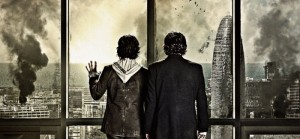
The main idea behind Los últimos días, the latest offering from directing/screenwriting brothers David and Àlex Pastor, is far from original. The basic plot – a mysterious and deadly epidemic that creates mass panic and, ultimately, complete social chaos – shares more than a passing likeness with M. Night Shyamalan’s 2008 movie The Happening, as well as I am Legend and Danny Boyle’s brilliant 2002 release, 28 Days Later.
Despite clear parallels with its predecessors, however, Los últimos días is no less worthy in its depiction of all-out human catastrophe. Indeed, it goes one step further, attempting a social critique similar to Blindness, the 2008 movie based on José Saramago‘s novel of the same name.
In the Pastors’ screenplay, set in modern-day Barcelona, people are gradually inflicted not by blindness, but by a fatal form of agoraphobia. Described in the media simply as “panic”, it renders them physically incapable of leaving the building in which they found themselves on being stricken.
Aside from the obvious observations about modern living and the amount of time we now spend indoors living “virtually” via a computer or TV screen (almost every single scene in Los últimos días is interior) the film provides a damning view of how we relate to our fellow man. While we ignore our neighbours and fail to show concern for our workmates, we become increasingly isolated, living in a climate of fear and paranoia leading – in this case – to a collective terror of the outside world.
Stylish doom
The opening scenes evoke an atmosphere of tension and uncertainty which effectively draw the viewer in, while the stylish use of image colour and sombre lighting create a feeling of claustrophobia and possible impending doom.
Thanks to a series of only partially explained events and flashbacks, which are capably knitted together, we follow the fates of Marc and Eduardo (played by Quim Gutiérrez and José Coronado) with interest, at least to start with.
The unlikely pairing of the two protagonists, erstwhile colleagues confined to their place of work, maintains our intrigue thanks to a tight script and competent acting. Through the flashbacks we learn that Marc was a harassed and over-worked employee, Eduardo the new HR manager called in to pile on the pressure. After disaster strikes they combine forces, in spite of their differences, to reach loved ones they have elsewhere in the city. All without setting foot outside.
Though there is nothing especially novel about the unfolding of events, or the development of Marc and Eduardo’s relationship, the film works thanks to tight pacing and – until about the 80th minute – an avoidance of cliché.
Sadly there is a sudden change of pace about an hour into the film, which I hoped desperately would just be a blip. Alas, it was not so, as the remainder of the movie – and particularly the last 20 minutes – descended into the sort of sickly mawkishness it had so far expertly avoided. I had the feeling that the ending had been tacked on, hurriedly penned by someone who felt it should be more ‘Hollywood’. The film becomes less of a reference to its similar predecessors and more of a direct copy. Perhaps the Pastors are like the twins in the Charlie Kaufman-penned Adaptation?
‘Los últimos días’ is on general release across Spain.
Leave a Reply
You must be logged in to post a comment.